 Cao da Serra de Aires is originated from Portugal but Yorkillon is originated from United States. Cao da Serra de Aires may grow 32 cm / 13 inches higher than Yorkillon. Cao da Serra de Aires may weigh 23 kg / 51 pounds more than Yorkillon. Both Cao da Serra de Aires and Yorkillon has same life span. Both Cao da Serra de Aires and Yorkillon has same litter size. Both Cao da Serra de Aires and Yorkillon requires Moderate Maintenance.
Cao da Serra de Aires is originated from Portugal but Yorkillon is originated from United States. Cao da Serra de Aires may grow 32 cm / 13 inches higher than Yorkillon. Cao da Serra de Aires may weigh 23 kg / 51 pounds more than Yorkillon. Both Cao da Serra de Aires and Yorkillon has same life span. Both Cao da Serra de Aires and Yorkillon has same litter size. Both Cao da Serra de Aires and Yorkillon requires Moderate Maintenance.
Basic Information
Group:
Herding dogs
Toy dog
undefined
Portugal
United States
Life Span:
12 - 14 Years
12 - 14 Years
Other Names:
Portuguese Sheepdog, Portuguese Shepherd Dog
Papa-ShirePapa-Shire • Papiyork • Yorkie Pap Papillon-Yorkshire Terrier Mix, Papillon-Yorkie Mix,
Colors Available:
Fawn, gray, yellow and black
White, brown and white, light brown/golden, dark brown/chocolate, black and brown, black
Coat:
Long, shaggy, single-layer coat,
Straight, medium, fine fine, soft coat
Shedding:
Moderate
Moderate
Temperament:
Affectionate, Alert, Cheerful, Courageous, Curious, Detached, Energetic, Friendly, Independent, Intelligent, Lively, Loving, Loyal, Outgoing, Playful, Protective, Responsive, Social, Stubborn, Territorial
Alert, Energetic, Friendly, Loving, Loyal, Playful
Grooming:
Moderate Maintenance
Moderate Maintenance
New Owners Friendly:
Yes
Yes
History
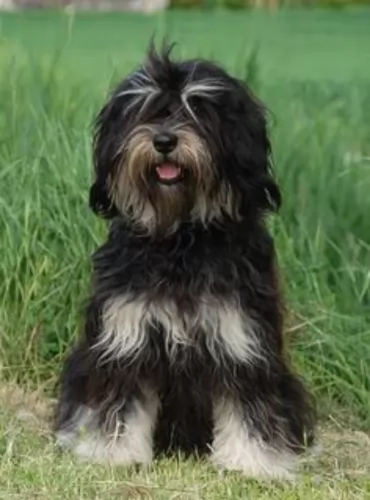 Ancestors of the Cao da Sera de Aires were used for herding livestock in the Serra de Aires and Alentejo, Portugal. This herding dog is native to Portugal and throughout the 20th Century he was kept as a working dog.
Ancestors of the Cao da Sera de Aires were used for herding livestock in the Serra de Aires and Alentejo, Portugal. This herding dog is native to Portugal and throughout the 20th Century he was kept as a working dog.
Known also as the Portuguese Sheepdog, Portuguese Shepherd Dog or Serra de Aires Mountain Dog, there are some questions surrounding the breed's ancestry as there are few records of dogs before 1900. The dog is thought to be related to the Pyrenean and Catalan Sheepdogs and that it has descended from Briards which were imported into Portugal and crossed with the Pyrenean Sheepdog.
The Cão da Serra de Aires breed standard was accepted by the Portuguese Kennel Club, and the breed was recognized internationally in 1996. The dog was also recognized by the United Kennel Club in the Herding Group in 2006.
The Yorkillon is a bighearted cross between the Yorkshire Terrier and the Papillon. They are small dogs with huge attitudes and big ears. They are known to be sassy and get into trouble. They are playful, affectionate and intelligent. They were initially developed in the US sometime about 20-30 years ago.
Not recognized by the American Kennel Club as they are considered designer dogs or mixed breeds
Description
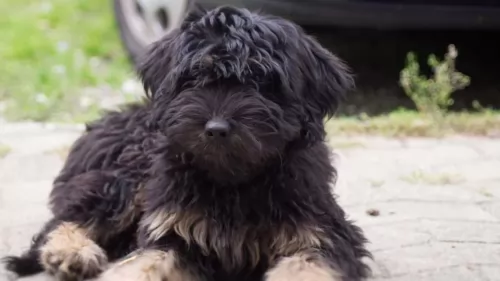 The beautiful Cão da Serra de Aires is a medium-sized dog. He stands at 45 to 55 cm at the withers and weighs about 17 to 27 kg. He is recognizable by the long, shaggy, single-layer coat, of straight or slightly wavy hair. Don’t be deceived by the coat as below, the dog has a muscular, athletic body.
The beautiful Cão da Serra de Aires is a medium-sized dog. He stands at 45 to 55 cm at the withers and weighs about 17 to 27 kg. He is recognizable by the long, shaggy, single-layer coat, of straight or slightly wavy hair. Don’t be deceived by the coat as below, the dog has a muscular, athletic body.
The coat comes in different shades such as fawn, gray, yellow and black. The dog has a long tail which is held straight out or down and he has medium-length, floppy ears. You’ve got to look hard, as the facial features of the dog are hidden by its shaggy coat. He has a lot of facial hair that sometimes you have to wonder if he can see out of his eyes.
Temperament:
The Cao da Serra de Aires is a wonderful canine companion and is devoted and loyal, forming strong bonds with their human family. He is a playful, amicable dog and gets on well with children in the home as well as with other pets.
He is intelligent and trainable, and when properly trained and socialized,he becomes an even nicer pet to have around and is obedient to his master’s voice. He is territorial, strong willed and dominant and makes a good watchdog too.
The Yorkillon is a small dog that can look like a Yorkie or a Papillon but most due have large ears like the Papillon. Both parent breeds have long hair and short legs. There is still a lot of first generation breeding, but most are now products of multigenerational breeding. This means that every puppy can look different and no two are likely to look the same.
Characteristics
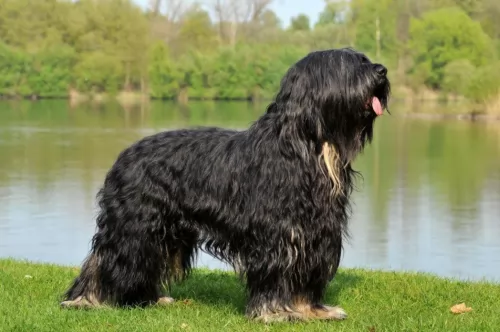 The Cão da Serra de Aires is such a loyal dog to his human family that he makes a splendid pet. He is active, having worked historically at herding and guarding.
The Cão da Serra de Aires is such a loyal dog to his human family that he makes a splendid pet. He is active, having worked historically at herding and guarding.
Socialization and obedience training ensure that he becomes an exceptional pet and he has a host of positive attributes to his name – he is intelligent, energetic, loyal and loving. He may have been used long ago to guard livestock, but today he is selected as a pet specifically for his excellent companionship and for his protective nature.
1.Children friendliness yes but be careful the children do not hurt the small dogs. This is particularly true regarding the risk of tracheal collapse.
2.Special talents – loves to do tricks
3.Adaptability – can live anywhere in an apartment as well as a home, but he would prefer to have a fenced yard to run in.
4.Learning ability – extremely smart and very obedient
Health Problems
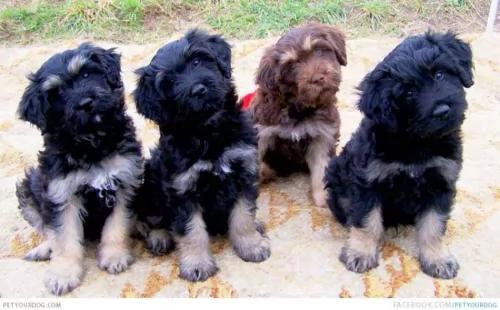 As with most dogs that are looked after well, their health can be good. The Cao da Serra de Aires isn’t likely to keep you at the vet often. Just like with any good dog, there are some health disorders that can benefit you to know about.
As with most dogs that are looked after well, their health can be good. The Cao da Serra de Aires isn’t likely to keep you at the vet often. Just like with any good dog, there are some health disorders that can benefit you to know about.
Being forewarned , you can get your pet to the vet quickly before the illness gets out of hand.
There are some pet owners who want to have their pets tested by the Orthopedic Foundation for Animals as well as the Canine Eye Registration Foundation to rule out health defects such as hip dysplasia and cataracts before they manifest themselves in their pets. This is of particular importance to breeders so as to prevent the parent dogs passing bad genetic conditions to the puppies.
Hip Dysplasia:
This is a common skeletal disease where the dog’s hip joints don’t develop properly. It can be terribly painful for your pet to get around. It’s a genetic condition and while it is more prevalent in big dogs, any breeds are susceptible.
Your dog will battle along with painful joints and sometimes his hind-end will be lame. You’ll notice that once lying down, he battles to get up again. Fortunately vets are well acquainted with this ailment and they have different options to treat and manage it.
Cataracts:
Cataracts in your dog come about from a disease process which affects the lens of the eye. The eye loses its transparency and impairs vision. There are some instances where cataracts can cause blindness. You’ll see a whitish gray area in your pets eye. The most common cause of cataracts is genetics. Get your pet to the vet who will do certain tests to evaluate the eyes and make a recommendation.
There are not a lot of hereditary health issues but there are some issues they can be prone to:
• Patellar Luxation – slipped knee caps can lead to lameness.
• Epilepsy – can be treated with medication.
• Diabetes – can be treated with medication
• Legg Calve Perthes Disease – blood disorder affecting hind leg bones.
• Heart defects
• Tracheal collapse
• Hip dysplasia – can cause lameness.
Caring The Pet
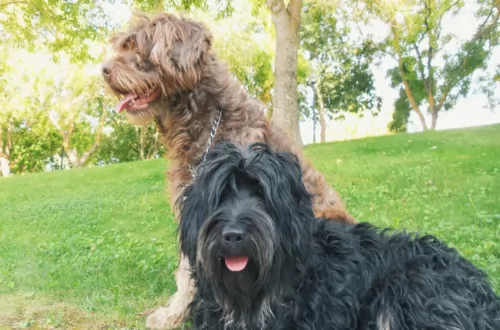 As a working dog used to long hours of action, the Cao da Serra de Aires will need lots of activity. He’ll need you taking him for long walks and playing ball games with him. He can become frustrated and destructive when left without any physical stimulation.
As a working dog used to long hours of action, the Cao da Serra de Aires will need lots of activity. He’ll need you taking him for long walks and playing ball games with him. He can become frustrated and destructive when left without any physical stimulation.
Grooming
The Cao da Serra de Aires may have long hair but he isn’t high maintenance. He won’t require professional grooming, but will require a good brush a least twice a week. This is because the long coat can tangle.
To keep him looking his best, you’ll want to be trimming the hair around his paws. Another important grooming task is checking his ears and cleaning them. You have to be careful about cleaning your pet ears if you don’t know how, as it could damage the ears. Your vet can always advise you on how this is done.
1.Feeding the puppy Feed a high quality toy puppy food 3-4 meals per day a total of ¼ cup for the day.
2.Feeding the adult Feed a high quality toy puppy food 1-2 meals per day a total of ½ cup for the day.
3.Points for Good Health – No inherited issues.
4. Games and Exercises – These are high energy dogs as both parent breeds are such. They need to run, love having a fenced yard, 15-20 minute walks per day.
Comparison with other breeds
- Cao da Serra de Aires vs English Bulldog - Breed Comparison
- Cao da Serra de Aires vs German Shepherd - Breed Comparison
- Cao da Serra de Aires vs Golden Retriever - Breed Comparison
- Cao da Serra de Aires vs Labrador Retriever - Breed Comparison
- Cao da Serra de Aires vs West Highland White Terrier - Breed Comparison
- Cao da Serra de Aires vs French Bulldog - Breed Comparison
- Cao da Serra de Aires vs Beagle - Breed Comparison
- Cao da Serra de Aires vs Yorkshire Terrier - Breed Comparison
- Cao da Serra de Aires vs Poodle - Breed Comparison
- Cao da Serra de Aires vs Rottweiler - Breed Comparison
- Cao da Serra de Aires vs Boxer - Breed Comparison
- Cao da Serra de Aires vs English Pointer - Breed Comparison
- Cao da Serra de Aires vs Siberian Husky - Breed Comparison
- Cao da Serra de Aires vs Doberman Pinscher - Breed Comparison
- Cao da Serra de Aires vs American Bully - Breed Comparison
- Cao da Serra de Aires vs Abruzzenhund - Breed Comparison
- Cao da Serra de Aires vs Affenpinscher - Breed Comparison
- Cao da Serra de Aires vs Afghan Hound - Breed Comparison
- Cao da Serra de Aires vs Aidi - Breed Comparison
- Cao da Serra de Aires vs Airedale Terrier - Breed Comparison
- Cao da Serra de Aires vs Akbash Dog - Breed Comparison
- Cao da Serra de Aires vs Akita - Breed Comparison
- Cao da Serra de Aires vs Africanis - Breed Comparison
- Cao da Serra de Aires vs Askal - Breed Comparison
- Cao da Serra de Aires vs Atlas Terrier - Breed Comparison
- Yorkillon vs English Bulldog - Breed Comparison
- Yorkillon vs German Shepherd - Breed Comparison
- Yorkillon vs Golden Retriever - Breed Comparison
- Yorkillon vs Labrador Retriever - Breed Comparison
- Yorkillon vs West Highland White Terrier - Breed Comparison
- Yorkillon vs French Bulldog - Breed Comparison
- Yorkillon vs Beagle - Breed Comparison
- Yorkillon vs Yorkshire Terrier - Breed Comparison
- Yorkillon vs Poodle - Breed Comparison
- Yorkillon vs Rottweiler - Breed Comparison
- Yorkillon vs Boxer - Breed Comparison
- Yorkillon vs English Pointer - Breed Comparison
- Yorkillon vs Siberian Husky - Breed Comparison
- Yorkillon vs Doberman Pinscher - Breed Comparison
- Yorkillon vs American Bully - Breed Comparison
- Yorkillon vs Abruzzenhund - Breed Comparison
- Yorkillon vs Affenpinscher - Breed Comparison
- Yorkillon vs Afghan Hound - Breed Comparison
- Yorkillon vs Aidi - Breed Comparison
- Yorkillon vs Airedale Terrier - Breed Comparison
- Yorkillon vs Akbash Dog - Breed Comparison
- Yorkillon vs Akita - Breed Comparison
- Yorkillon vs Africanis - Breed Comparison
- Yorkillon vs Askal - Breed Comparison
- Yorkillon vs Atlas Terrier - Breed Comparison
 Petzlover
Petzlover Cao da Serra de Aires is originated from Portugal but Yorkillon is originated from United States. Cao da Serra de Aires may grow 32 cm / 13 inches higher than Yorkillon. Cao da Serra de Aires may weigh 23 kg / 51 pounds more than Yorkillon. Both Cao da Serra de Aires and Yorkillon has same life span. Both Cao da Serra de Aires and Yorkillon has same litter size. Both Cao da Serra de Aires and Yorkillon requires Moderate Maintenance.
Cao da Serra de Aires is originated from Portugal but Yorkillon is originated from United States. Cao da Serra de Aires may grow 32 cm / 13 inches higher than Yorkillon. Cao da Serra de Aires may weigh 23 kg / 51 pounds more than Yorkillon. Both Cao da Serra de Aires and Yorkillon has same life span. Both Cao da Serra de Aires and Yorkillon has same litter size. Both Cao da Serra de Aires and Yorkillon requires Moderate Maintenance.  Ancestors of the Cao da Sera de Aires were used for herding livestock in the Serra de Aires and Alentejo, Portugal. This herding dog is native to Portugal and throughout the 20th Century he was kept as a working dog.
Ancestors of the Cao da Sera de Aires were used for herding livestock in the Serra de Aires and Alentejo, Portugal. This herding dog is native to Portugal and throughout the 20th Century he was kept as a working dog. The beautiful Cão da Serra de Aires is a medium-sized dog. He stands at 45 to 55 cm at the withers and weighs about 17 to 27 kg. He is recognizable by the long, shaggy, single-layer coat, of straight or slightly wavy hair. Don’t be deceived by the coat as below, the dog has a muscular, athletic body.
The beautiful Cão da Serra de Aires is a medium-sized dog. He stands at 45 to 55 cm at the withers and weighs about 17 to 27 kg. He is recognizable by the long, shaggy, single-layer coat, of straight or slightly wavy hair. Don’t be deceived by the coat as below, the dog has a muscular, athletic body. The Cão da Serra de Aires is such a loyal dog to his human family that he makes a splendid pet. He is active, having worked historically at herding and guarding.
The Cão da Serra de Aires is such a loyal dog to his human family that he makes a splendid pet. He is active, having worked historically at herding and guarding. As with most dogs that are looked after well, their health can be good. The Cao da Serra de Aires isn’t likely to keep you at the vet often. Just like with any good dog, there are some health disorders that can benefit you to know about.
As with most dogs that are looked after well, their health can be good. The Cao da Serra de Aires isn’t likely to keep you at the vet often. Just like with any good dog, there are some health disorders that can benefit you to know about. As a working dog used to long hours of action, the Cao da Serra de Aires will need lots of activity. He’ll need you taking him for long walks and playing ball games with him. He can become frustrated and destructive when left without any physical stimulation.
As a working dog used to long hours of action, the Cao da Serra de Aires will need lots of activity. He’ll need you taking him for long walks and playing ball games with him. He can become frustrated and destructive when left without any physical stimulation.